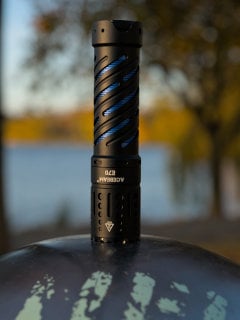Stacked camera sensors have been a thing for a while now; they have improved sensitivity to light by stacking translucent photodiodes on top of each other.
The Nichia 719A is the inverse; translucent LEDs are stacked on top of each other (in a single package) for increased intensity.



I worry about the huge flux range. Most emitter bins are like ±4-5% flux. 719A bins are ±10% flux. So theoretically you could be looking at close to 20% swings in lumens and throw from emitter to emitter. And you can’t drive them past 2.5A so you can’t drop one into a D1/KR1 or any lights really since most 6V drivers are 4A+.
Hopefully they are more throwy than an XPLHI or XHP35 otherwise idk.
Do we know how hard they can really be driven? Zebralight won’t drive them hard of course, but they don’t drive anything else hard either.
Djozz tested some that Simon sent him on BLF and they permanently failed above 3A. Mcbob said the same thing in the comments in regards to his own testing and said he doesn’t think they should be driven above 2.5A.
Above 2.5A CRI drops under 90, Duv and CCT go way up.